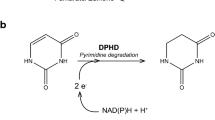Summary
Mutants of Saccharomyces cerevisiae without detectable phosphofructokinase activity were isolated. They were partly recessive and belonged to two genes called PFK1 and PFK2. Mutants with a defect in only one of the two genes could not grow when they were transferred from a medium with a nonfermentable carbon source to a medium with glucose and antimycin A, an inhibitor of respiration. However, the same mutants could grow when antimycin A was added to such mutants after they had been adapted to the utilization of glucose. Double mutants with defects in both genes could not grow at all on glucose as the sole carbon source. Mutants with a single defect in gene PFK1 or PFK2 could form ethanol on a glucose medium. However, in contrast to wild-type cells, there was a lag period of about 2 h before ethanol could be formed after transfer from a medium with only nonfermentable carbon sources to a glucose medium. Wild-type cells under the same conditions started to produce ethanol immediately. Mutants with defects in both PFK genes could not form ethanol at all. Mutants without phosphoglucose isomerase or triosephosphate isomerase did not form ethanol either. Double mutants without phosphofructokinase and phosphoglucose isomerase accumulated large amounts of glucose-6-phosphate on a glucose medium. This suggested that the direct oxidation of glucose-6-phosphate could not provide a bypass around the phosphofructokinase reaction. On the other hand, the triosephosphate isomerase reaction was required for ethanol production. Experiments with uniformly labeled glucose and glucose labeled in positions 3 and 4 were used to determine the contribution of the different carbon atoms of glucose to the fermentative production of CO2. With only fermentation operating, only carbon atoms 3 and 4 should contribute to CO2 production. However, wild-type cells produced significant amounts of radioactivity from other carbon atoms and pfk mutants generated CO2 almost equally well from all six carbon atoms of glucose. This suggested that phosphofructokinase is a dispensable enzyme in yeast glycolysis catalyzing only part of the glycolytic flux.
Similar content being viewed by others
References
Banuelos M, Gancedo C, Gancedo JM (1977) Activation by phosphate of yeast phosphofructokinase. J Biol Chem 252:6394–6398
Barnett JA (1976) The utilization of sugars by yeasts. Adv Carbohydrate Chem 32:126–234
Bergmeyer HU (1970) Methoden der enzymatischen Analyse, vol 1. Verlag Chemie, Weinheim, pp 100–163
Breitenbach-Schmitt I (1981) Genetische und physiologische Hinweise auf die Existenz eines zweiten Stoffwechselwegs neben der “klassischen” Phosphofruktokinasereaktion beim Abbau von Glucose in Saccharomyces cerevisiae. Doctoral Thesis, Technische Hoschschule Darmstadt
Ciriacy M, Breitenbach I (1979) Physiological effects of seven different blocks in glycolysis in Saccharomyces cerevisiae. J Bacteriol 139:152–168
Clifton D, Fraenkel DG (1982) Mutant studies of yeast phosphofructokinase. Biochem 21:1935–1942
Clifton D, Weinstock SB, Fraenkel D (1978) Glycolysis mutants in Saccharomyces cerevisiae. Genetics 88:1–11
Horecker BL, Rosen OM, Kowal S, Rosen S, Scher B, Lai CY, Hoffee P, Cremona T (1968) Comparative studies of aldolases and fructose diphosphatases. In: Mills AK (ed) Aspects of yeast metabolism. Blackwell, Oxford Edinburgh, pp 71–103
Huse K, Kopperschläger G (1983) Interactions of antibodies against soluble phosphofructokinase with the soluble and particulate enzymes from yeast. FEBS Lett 155:50–54
Lobo Z, Maitra PK (1982a) A particulate phosphofructokinase from yeast. FEBS Lett 137:279–282
Lobo Z, Maitra PK (1982b) Genetic evidence for distinct catalytic and regulatory subunits in yeast phosphofructokinase. FEBS Lett 139:93–96
Lobo Z, Maitra PK (1983) Phosphofructokinase mutants of yeast. J Biol Chem 258:1444–1449
Maitra PK (1971) Glucose and fructose metabolism in a phosphoglucoseisomeraseless mutant of Saccharomyces cerevisiae. J Bacteriol 107:759–769
Schmitt HD, Zimmermann FK (1982) Genetic analysis of the pyruvate decarboxylase reaction in yeast glycolysis. J Bacteriol 151:1146–1152
Tijane MN, Chaffotte AF, Seydoux AF, Roucous FJ, Laurent M (1980) Sulfhydryl groups of yeast phosphofructokinase-specific localization on β subunits of fructose-6-phosphate binding sites as demonstrated by a differential chemical labeling study. J Biol Chem 255:10188–10193
Zimmermann FK (1975) Procedures used in the induction of mitotic recombination and mutation in the yeast Saccharomyces cerevisiae. Mutat Res 31:71–86
Author information
Authors and Affiliations
Additional information
Communicated by H. Böhme
Rights and permissions
About this article
Cite this article
Breitenbach-Schmitt, I., Heinisch, J., Schmitt, H.D. et al. Yeast mutants without phosphofructokinase activity can still perform glycolysis and alcoholic fermentation. Mol Gen Genet 195, 530–535 (1984). https://doi.org/10.1007/BF00341458
Received:
Issue Date:
DOI: https://doi.org/10.1007/BF00341458




